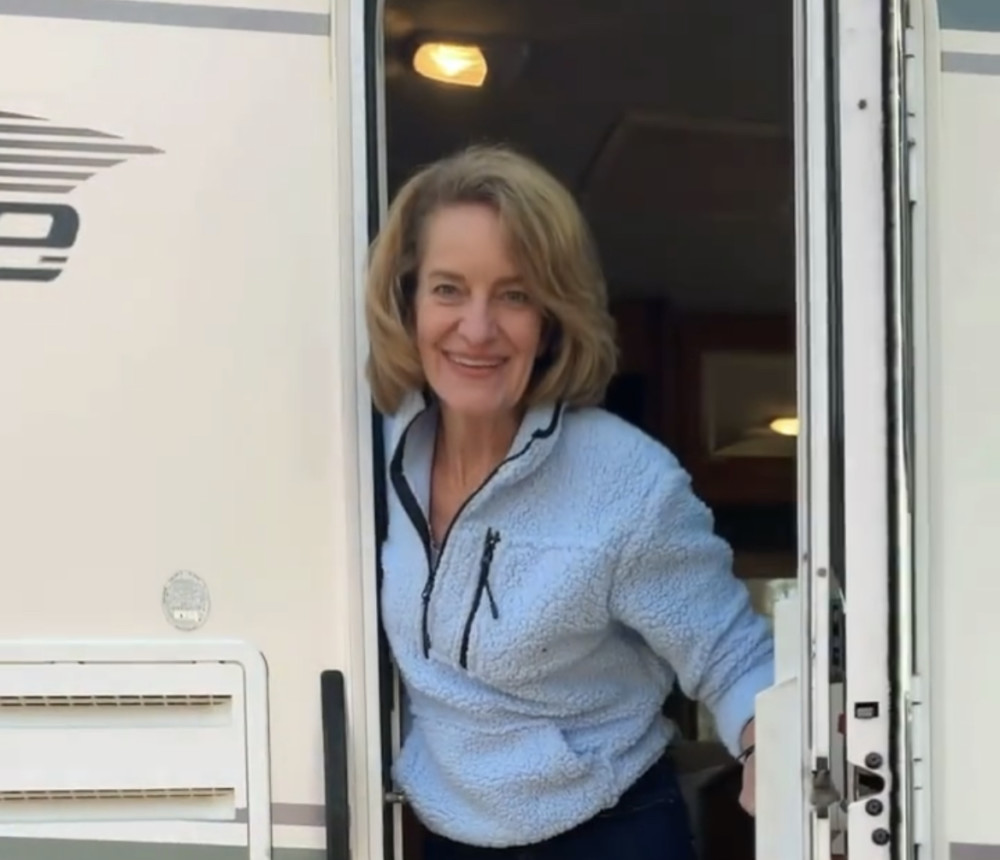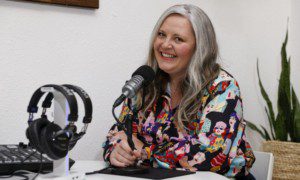Martha Quillin
The News & Observer (Raleigh, N.C.)
WWR Article Summary (tl;dr) Inspired by the work of Brandon Stanton, author of “Humans of New York,” Michelle Fishburne travels the country in a motor home interviewing people along the way.
Raleigh
Michelle Fishburne didn’t worry too much after losing her public relations job last spring in a pandemic-induced company downsizing. She had plenty of experience and a wide professional network.
But after sending out 86 fruitless cover letters in search of a new job, she began to think her willingness to relocate for work was going to be her greatest asset.
Inspired by the work of Brandon Stanton, author of “Humans of New York,” Fishburne let her Chapel Hill lease expire last July, moved into her 29-foot Jamboree motor home and set out to travel the country interviewing people along the way.
At first, Fishburne was looking at her travels as a way to build a portfolio so that, once COVID-19 is under control and she can meet potential employers face to face, she would have some fresh work to show. But after a few months on the road she realized her work had documentary value, and she began presenting it online as an oral history project she calls, “Who We Are Now.”
It features stories that highlight the way COVID-19 has altered Americans’ lives.
“Storyteller’ is a job,” Fishburne says she has discovered, and she’s enjoying becoming one.
Traveling in her genes
What might have been the most daunting part of the journey for some — the setting out — was easy for Fishburne.
If wanderlust is a gene, it travels in her family; her grandparents lived for two years in a 22-foot trailer they moved around the town of Plainfield, N.J., during the Great Depression in the mid-1930s after Fishburne’s granddad lost his job as a salesman. Growing up, Fishburne took long camping trips with her parents.
She and her two children spent months at a time on the road too, in the early 2000s, with a pop-up camper and sights along the way serving as a classroom. Later, Fishburne and her then-husband bought the Jamboree, and Fishburne took it on several long trips with different family configurations.
Fishburne still had the motor home when she lost her job last spring. Though it’s just a little smaller than a school bus, she’s at ease at its wheel. She decided to start with a trip she had made from North Carolina many times: She headed west for Wyoming and Yellowstone National Park.
Fishburne, 57, describes herself as intensely curious. She studied political science at UNC, graduating in 1984, and went to the University of Virginia for a law degree. In addition to her PR jobs, she has worked on the campaigns of both Republican and Democratic candidates.
She believes everybody has a story, and she wants to hear it and share it.
By December, Fishburne said, she had collected 130 of those stories, dozens of which already are edited and posted on her website. (www.whowearenow.us/) She took a Christmas break to visit with her children and is setting out again this month, with a plan to collect a total of 450 interviews by March, a year after the arrival of COVID-19. She plans to feature residents from every state.
Different ideologies, similar hopes
Setting out, Fishburne said, in the midst of a pandemic and during one of the most politically divided eras of the nation’s history, she wondered, “Am I going to know my country?”
She anticipated uncomfortable encounters, she said, but found none, only people who had vastly disparate political views but similar hopes for their lives and for those of their families.
Fishburne said the key to success has been following the map from one small town to another. She met people at a kite festival in Wyoming, a bed-and-breakfast in New Mexico, a Kiwanis Club meeting in Alabama. She found a man in Valdosta, Ga., who started a mobile ax-throwing business as a way to make a living during the pandemic.
Several North Carolina folks are included in the project so far: a comedian, a hairdresser, a musician, a restaurant operator and Eryk Pruitt, who owns a bar in Hillsborough with his wife, Lana Pierce.
The couple had spent years managing bars and restaurants for other owners before opening their own place, Yonder, in downtown Hillsborough in June 2019. Things were going great, Pruitt said, until COVID-19 hit and Gov. Roy Cooper ordered bars to shut down in mid-March.
Pruitt said he and his wife had to completely shift gears, switching their thinking from looking for ways to attract as many people as possible to their bar to figuring out ways to entertain fewer, more distanced customers in a way that could sustain the business.
It was his wife’s idea, Pruitt said, to come up with a good recipe to make a “frose,” or frozen rose, and sell it in a takeout Mason jar customers could pick up at the door.
The drinks were delicious, Pruitt said, and Yonder’s customers came in droves to buy them and other items to support the business and help it alive.
The story of Yonder bar’s survival through the pandemic has elements of American ingenuity, perseverance, sense of community and the value of addressing grievances to the government, since Pruitt was one of many bar owners who complained that Cooper’s rules about bars were illogical and unfair.
He’s glad Fishburne included it in her project because, he said, it might inspire others.
“Maybe some other business owner who thinks he’s tried everything will see it and think, ‘Wait, we haven’t tried everything. Let’s try this,’ and maybe it would keep them alive.
“Hopefully that’s what Michelle is doing. She’s showing some stories of hope that will spark something in somebody’s head.”
Not an easy job
While it may sound to some like a vacation, Fishburne said the project involves much work over days that start at 7 a.m. and end at midnight. Travel time is only part of it. Fishburne spends hours scouring news sites and talking with sources in towns she plans to visit in search of people to interview for the project.
She stays mostly in commercial campgrounds, she said, to be sure she has access to the internet so she can work through interview transcriptions, post the profiles and plan her next move.
She’s not sure where the project will lead, but Fishburne said she has talked about what she’s doing with book publishers, oral historians and documentarists. Ultimately, she said, she still hopes to parlay the experience into another job, possibly with a non-profit, telling the stories of the people it works to help.
Like many of the people featured in “Who We Are Now,” Fishburne said, she has found her life drastically changed by the pandemic even though she hasn’t been ill.
“This has set up a different path for me.”
___
©2021 The Charlotte Observer. Visit at charlotteobserver.com. Distributed by Tribune Content Agency, LLC.
















































































































































































































































































































































































